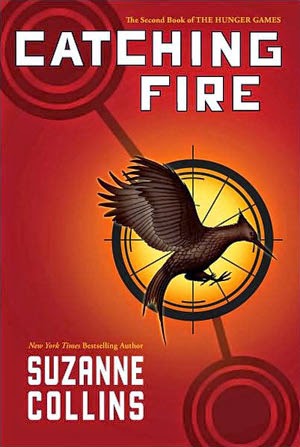I've been pounding through the first book of Dante Alighieri's Divine Comedy--Inferno--which is a newer translation, complete with end notes for every canto; pretty dense. So I took a break in the middle of it to read Catching Fire by Suzanne Collins, the second book in The Hunger Games trilogy. Its been a while since I read the first book but I didn't discover the books until after the movie was announced. A bunch of books were sold after that, and after the buzz blew over, my library had a load of copies in the book sale. I should have picked up one of each at that point because when I was looking for copies after I read the first one, there was a waiting list and then I forgot about it until the next movie was announced. I'll have to keep my eye out for the third one.
This second installment is definitely the middle book; it extends the storyline, deepens the backstories, fills in some of the questions from the first book, and then leaves you hanging for the third book. That's not a bad thing, but I guess it would be nice for this story to stand on its own the way the first one did. This one does come to a close, sort of, but its a cliffhanger.
This is prime young adult science fiction, its got angst, action, teen love, dystopian future, class warfare, and like a lot of recent YA SciFi, death. At least the constant threat of it for the main characters, and lots of blood and death of those around them to remind them of how bad it is. Collins certainly understands the genre, and just like the librarian who originally recommended this to me said, its a fast read. I burned through this is 3 or 4 days. that's quick for me
Dante is good, and I'm even reading a little of the old Italian version. But man, are the end notes dry. Fascinating and informative, sure, but... [yawn.]
This one is not as up close and personal with the death of children. It seems like that may have been a little harsh for some folks in the first book. Collins has found an interesting way to calm that down, and to also pull back from it so its not so immediate to the reader. I'll keep my eyes out for the third book at the library. Maybe I'll get it before the third movie comes out.
book reviews, bookmark collection, discussions about libraries, library design, information technology... and robots.
Saturday, October 18, 2014
Monday, October 6, 2014
simplicissimus

This book is funny, baudy, crude, and very entertaining. It's written in first person, so Simplicius gets to tell his own story, and because he's so vulgar the first person allows the author to separate himself from this character, and because Simplicius is so simple, he can get away with much more than any polite member of society would be allowed, simply because he doesn't know any better. Quite a trick. It may also help explain why this book became so popular; well heeled folks could laugh at it because the protagonist is so simple. And make no mistake, given the literacy profile of the population in the 15th century, it's definitely the upper classes who are buying and reading this book.
Simplicius Simplicissimus follows the life story of this young man from his ignorant peasant upbringing through his various trials in all the walks of life, driven by the engine of the ongoing 30 Years War. As this simple boy is tossed by the war raging around him, each place he falls places him in a different situation, which then allows the author to commentate on each of these stations from the point of view of a simple young man who is surprised by almost everything he sees, thus allowing him to point out what he sees at the outrages that swirl around us without our focusing on them.
The author is listed on the title page as Johann Jakob Christoffel von Grimmelshausen, but it seems that he is known as Hans rather than Johann, in English, I also saw one reference to Jacob vs. Jakob. While we're at it, the original title in German is "Der Abenteuerliche Simplicissimus Teutsch." In English, that's translated as The Adventures of Simplicius Simplicissimus.
The translation is marvelous and I think it his work that allows this story to resonate so powerfully today. The ideas themselves deserve credit however, and observations made then could in many cases by made much the same today. Human nature is indeed immutable. Mike Mitchell did this translation in 1999. Mitchell is described in the frontmatter as "one of Dedalus's editorial directors as is responsible for the Dedalus translation programme."
Who knew 1668 was so much fun in Germany! Read this book!
Subscribe to:
Comments (Atom)

